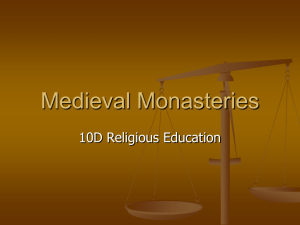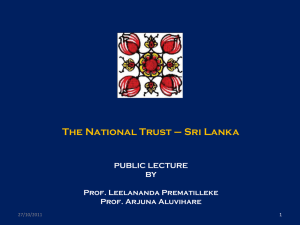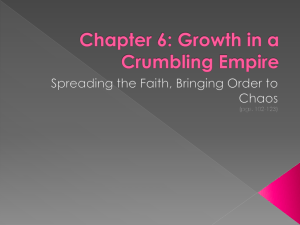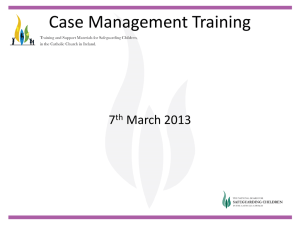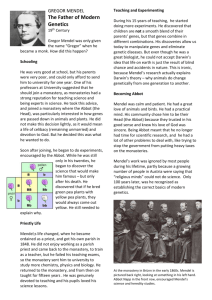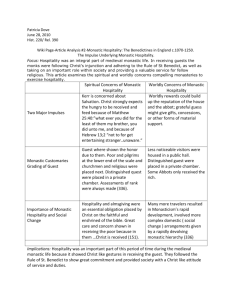The Monastic and Monastic Relations
advertisement
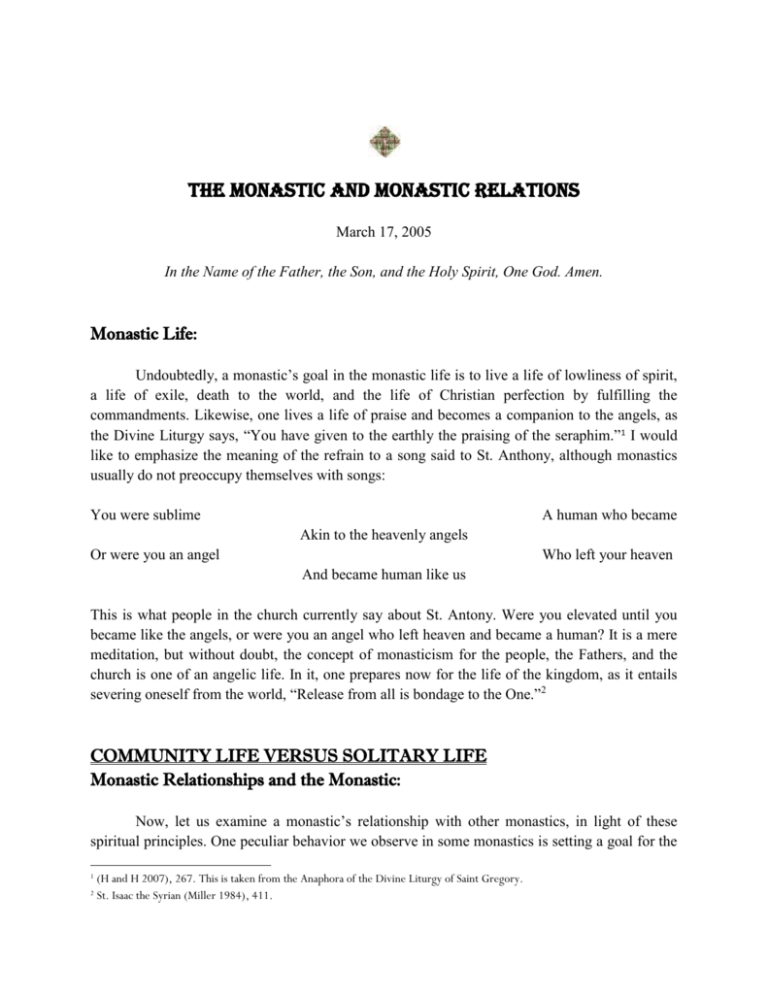
THE MONASTIC AND MONASTIC RELATIONS
March 17, 2005
In the Name of the Father, the Son, and the Holy Spirit, One God. Amen.
Monastic Life:
Undoubtedly, a monastic’s goal in the monastic life is to live a life of lowliness of spirit,
a life of exile, death to the world, and the life of Christian perfection by fulfilling the
commandments. Likewise, one lives a life of praise and becomes a companion to the angels, as
the Divine Liturgy says, “You have given to the earthly the praising of the seraphim.”1 I would
like to emphasize the meaning of the refrain to a song said to St. Anthony, although monastics
usually do not preoccupy themselves with songs:
You were sublime
A human who became
Akin to the heavenly angels
Or were you an angel
Who left your heaven
And became human like us
This is what people in the church currently say about St. Antony. Were you elevated until you
became like the angels, or were you an angel who left heaven and became a human? It is a mere
meditation, but without doubt, the concept of monasticism for the people, the Fathers, and the
church is one of an angelic life. In it, one prepares now for the life of the kingdom, as it entails
severing oneself from the world, “Release from all is bondage to the One.”2
COMMUNITY LIFE VERSUS SOLITARY LIFE
Monastic Relationships and the Monastic:
Now, let us examine a monastic’s relationship with other monastics, in light of these
spiritual principles. One peculiar behavior we observe in some monastics is setting a goal for the
1
2
(H and H 2007), 267. This is taken from the Anaphora of the Divine Liturgy of Saint Gregory.
St. Isaac the Syrian (Miller 1984), 411.
life of solitude and stillness. Yes, this is imperative as the word Monaxoc (Monachos) means
hesychast, one who lives a solitary life, but we might find one practicing the life of exile and
solitude towards fellow monastics, while opening the door, heart, and ears to lay people. This
one recoils from monastics inside the monastery, but does not withdraw from socializing with
seculars (refusing to receive monastics into the cell, or cave, but receives lay people). What
exactly is the meaning of this solitude? This one might protest, “I practice the life of solitude
inside the monastery in order to stay away from its news and problems. I want to live in peace in
the monastery. I do not want to have relationships with monastics that would lead me to
hardships. As for seculars, they are not associated with monastery politics, and so I could live in
peace despite their visits or interactions with me.” This behavior is an absolute failure, and is
wholly rejected, because the saints say “we are strangers brethren, therefore let us be complete
strangers.”3 If you want to live a life of exile, it should be genuine, not the mere appearance of
solitude. Conversely, I say a person should grow distant from lay people, and socializing with
them, and continue in the relationships with the monastics. When one reaches complete exile
regarding relatives and monastery guests, then one begins withdrawing from the coenobitic
community.
Since we are speaking about the monastic, and relationships with other monastics, I
wanted to begin by clarifying that some counter-behaviors that do take place, do not agree with
the concepts we received from the Fathers regarding the life of exile and solitude.
Community Life is a Successful Beginning:
To begin, as we know, the monastic must first succeed in community life inside the
monastery. Community life inside the monastery obligates you to gain spiritual virtues. You live
the life of lowliness of spirit, because the Lord Jesus said, “Blessed are the poor in spirit, for
theirs is the kingdom of heaven.”4 You also gain the virtue of humility and practice other
Christian virtues. Most important of these is the virtue of love, and so, you win the love of the
monastics and serve them. When the monastery feels that you have served and suffered much,
laboring in renovation, agriculture, or in any other service regarding the life of the monastery,
then the monastery would feel that you are not a burden. You have applied this principle: “These
hands have provided for my necessities, and for those who were with me.”5
You must refuse the principle of living on the bread of charity because if this principle
augments, it will continue even when you become a solitary in the wilderness. You will then
want people to come take the blessing of ‘this saint’ and Satan could begin to create disturbances
by means of supernatural gifts. People also could unsettle you, claiming that your prayers move
(Saint Barsanuphius) (Beni-Suef Publication Committee 1977), 160.
(The New King James Version 1982), Mt 5:3. All Biblical References are from the New King James Version (NKJV), unless
otherwise stated.
5 Act 20:34.
3
4
mountains and that devils tremble from you. You could find this an easy and profitable route, as
visitors flock from every place and direction carrying their vows and first-fruits.
A monk in one of the monasteries actually built several extravagant buildings and
churches on visitors’ donations, which he personally received, to the extent that he built an entire
monastery outside the monastery. When he was asked if this was not the monastery’s possession,
he answered, “No, this is my responsibility! This is mine!” In this way, he abused people’s
simplicity and trust in the Hagiography which they read about in The Paradise Of The Holy
Fathers, in a way that does not agree whatsoever with the life of exile, the life of lowliness, or
the virtue of love. On the contrary, such a person only creates problems with the superior and
authority figures in the monastery, and provokes friends and loved ones against the monastery, in
order to do one’s own bidding.
On the contrary, those in the monastery should feel that you have lived and labored in it,
saying, “This monastic labored in building the bakery. This monastic labored in organizing the
pharmacy. This monastic labored in building the new monastic cells.” Each monastic should feel
that he has a memoir in his cell from you before you venture into solitude; the walls of the
monastery themselves should witness to your labor and watchfulness. Generally, you should feel
that you came in order to sojourn from the world and secular people, and not to sojourn from
fellow monastics; plant this within your heart from the start. You died to the world in order to
live in a new world, the monastery, not to rebuff the monastic community and consider the
monastics as troublemakers to be eliminated and avoided. Do not overlook that the virtue of
humility could not be gained except by enduring hardships received from others.
Occasionally, Satan deceives a person, like the monk to whom Satan suggested
eliminating the sin of anger and loss of inner peace by venturing into solitude. He asked the
abbot’s permission to go live in a cave for the sake of his salvation. There, he placed a jug of
water at the entryway, and every so often the wind would blow, tipping over the jug and spilling
the water (water is rare in those parts and is only obtainable with great effort). Finally, he lost his
temper and smashed the jug to pieces. At this point, the monk realized that when he ventured
into solitude, an angry nature and the devil of anger accompanied him. Therefore, he returned to
the monastery, begged forgiveness, apologized, and said, “Here the virtues of endurance and
patience could be gained.”6
Extreme Right and Extreme Left:
The elders with whom we lived in the monastery would tell us the following very
important piece of advice: “A monastic could deviate in either of two extremes – either toward
over-socializing with fellow monastics to the point of becoming ‘a bench monastic’ or toward
rushing into solitude before obtaining the virtues of community life.” Rather, the correct way to
the monastic life is to be very serious about sitting in the cell, and the life of solitude and stillness
6
Unknown Elder, cf. (Ward, Desert Fathers 2003), 71 {33}; (Thornton and S 1998), 94-95 {xxxiii}.
from one side, and leave the cell to deal with fellow monastics with a spirit of humility and love,
using interactions with other monastics to examine and evaluate the self, spiritual growth, and
development; thus, gaining virtues by dealing with monastics. Likewise, you could obtain other
virtues in dealing with the monastics; observe their spiritual virtues.
There is a difference between reading about a virtue and actually encountering it. Actual
contact with virtues forces a person to implement them practically in life. Dealing with a loving,
self-sacrificing, serving person embarrasses the onlooker; in the same fashion, dealing with a
humble, self-denying person, who attributes merit to others while ascribing ignorance and lack of
knowledge to oneself (although very knowledgeable) forces the observer to reevaluate the self.
This is an extremely violent portrait, although outwardly it appears very calm. You could reach
the point of self-intolerance. For example, if you are struck with self-conceit, pride, boasting, and
seeking status positions, when you meet a monastic who is apathetic toward these, you
reevaluate yourself, saying, “Where am I and where is monasticism? ‘I have not yet become a
monk myself, but I have seen monks.’7”
We return to the principle set by the elders: “The cell is the bakery where you bake the
relationship with God. The cell is the place where you are filled with the Holy Spirit. The cell is
the place where you examine yourself and experience the life of repentance and fellowship with
God.” You should come out of the cell, not as one descending from the highest heaven to hellish
earth, but rather in order to put into practice the life of stillness that you have obtained. Will you
be able to safeguard your tongue? Will you be able to practice humility? Has lowliness of spirit
found a true way into your heart? Is the virtue of endurance present? Do you continue to fall into
the sin of judgment? You should not sorrow for being in the community, saying, “Since I judge
others, it is best for me to venture into the inner wilderness.” Rather, you should say, “Since I
judge, I need to sit with myself, admonish it, and practice the sacrament of repentance and
confession.” The solution is not withdrawal in order not to judge. Likewise, if you grow angry,
you should not say, “I will flee from the community so as not to become angry”; rather, realize
that this unearths the remains of spiritual illnesses abiding within you, which need treatment. As
we say in the Great Fast hymn:
Take to your healing a good physician
Reveal your wound to him clarion
He will offer for your healing, unction
Repentance, confession, and absolution.8
This is the importance of having a confession father, especially when you are still struggling
against certain weaknesses.
While praying, you might be struck with boredom, not knowing the reason you are
praying, but when you are made aware of your weaknesses, perhaps prayer will have a certain
7
8
Cf. (Ward, Sayings 1984), 125 {2}.
Cf. (Abdelmesih 1989), 279.
taste. I am not encouraging you to have weaknesses, but I want to clarify that even these
weaknesses could be a stairway helping you progress in the life of prayer. While you say, “How
long, O Lord? Will You forget me forever… Lord, how they have increased who trouble me… O
Lord, do not rebuke me in Your anger… How long will my enemy be exalted over me,”9 be aware
of your weaknesses that need correction. If you want to abandon community life because you are
sorrowful for having weaknesses inside the community life, when then will you learn to correct
yourself through prayer? Community life provides an opportunity for these weaknesses to
manifest, rather than being struck with vainglory, false praise, and believing yourself the
archimandrite of the wilderness, while you have not yet begun the spiritual way. This is why,
after beginning the solitary life, you would find yourself comfortless, and so you would seek
consolation from people — consolation in feeling that people speak of the saint, the wonderworker, the one who revived the era of the fathers.
The matter reached the point that a novice (rejected from a monastery) established a
monastery in the desert, dressed as a monastic, assumed the name of a saint or an anchorite, and
deluded people into thinking that this saint is under his command and at his service. People
flocked to him from every place and direction, and to those who had requests, his reply was, “I
will tell the saint to take care of this matter for you.” All these people considered this monastic a
representative of this saint, the deputy of divine providence for the name and blessings of this
saint.
Not only monastics, but we also might be astonished to find a secular priest who has in
his possession a manuscript with the life story of a saint or martyr. He asks the diocesan
metropolitan or bishop to consecrate an icon for him by the name of that saint or martyr. After it
is consecrated, we are surprised to find the priest assume the title: “Servant of the saint’s
biography.” If we ask, “Have you been ordained for this saint?” the answer is, “No, but I found a
manuscript that contains the life story.” He publishes the manuscript in a book and we find it full
of theological errors: a female saint anointing with Myron or oil, St. Mary appearing to her and
anointing people with Myron, or similar events that do not agree whatsoever with the seven
sacraments of the church. Should you not offer the manuscript (with all its errors) for review
before publication? This brings him publicity and tours (all this over an icon consecrated by the
bishop), while the priest appoints himself a servant of the life story of the saint and a delegate of
divine providence. The saint has appointed him shepherd of the life story, icon, and books!
Furthermore, other books appear regarding the miracles occurring through this saint. Conflicts
arise between the priest and the metropolitan: “What are you doing? What books are you
publishing?” Church leadership must then intervene to settle these disputes. This is all based on
the concept of being a self-appointed delegate of divine providence for any matter.
In the monastery, your cell should be a sanctuary or shrine. People should say, “This is
the cell where this monastic dwelt for years before venturing into solitude,” without you boasting
or seeking praise. Before dwelling in a cave, you must dwell in the hearts of all the monastics;
the monastery walls should witness to your tears, patience, prayers, and endurance; the
9
Ps 13:1; 3:1; 6:1; 13:2.
monastery churches should witness to your humility, spirituality, and lowliness; the whole
monastery wishes for one of those days. They would bemoan you if you had departed to heaven
or if you had ventured into the wilderness: “Blessing everyone and receiving everyone’s
blessings.” 10
Peace with the Monastic Community before Venturing into Solitude:
Occasionally, conflicts occur between monastics. Here, a monastic should ask, “How
many monastics are there in the monastery? Perhaps there are fifty. If I lose a monastic each day,
in fifty days I will have lost the entire community. Or, if I lose a monastic each week, in fifty
weeks I will have lost the entire community. Therefore, in about a year, I will have lost the entire
monastic community. If the monastery has one hundred monastics, I will lose the community in
two years!” If you collide with a different monastic every so often, finally, you will decide to
boycott all the monastics: “I do not like to deal with this monastic who is quick tempered, or this
one who likes to boast, or this one who does not like to serve others, or this one who did not
respect me appropriately during the greeting, or this one who took my place and was ordained
before me, or this one who did not sufficiently care for my family during their visit, or this one
who interacts much with the head of the monastery, or this one who did not allow me to borrow a
specific book from the library.”
One time, when I was building my outlying cell at the Syrian Monastery (before I was
ordained a bishop) a fine monk, who was a dear friend of mine since I entered the monastery,
came and began debating with me. During the debate, a dispute occurred between us.
Immediately thereafter, I went to his cell, prostrated before him, and apologized. He was pleased
and praised this action, so I responded, “Father, if we lose a monk each day, we will lose all the
monks.” At this time, His Holiness had asked me to build a cell outside the monastery to dwell
in, but will I dwell in this cell without peace between the monastery and me? How could that be?
How could the monastery serve a solitary person, whom they feel is a burden and a leech,
unless the solitary person has served the monastery, and the monastics have loved this person? In
order to avoid feeling like a leech, one takes a shortcut and forgoes all assistance from the
monastery, receiving all needs from friends. “Do your friends provide for all your needs? Are
you no longer monasticized with us?” To which the response might be, “But I come to pray the
Liturgy.” If you do not eat the monastery’s bread, then you are not a monastic at this monastery;
you are simply delegated to pray. Therefore, a monastic needs to avoid two extremes: oversocializing with monastics and losing the life of stillness in the cell, or isolation from the
monastic community with the excuse of stillness and remoteness from others.
Progression in the Life of Solitude:
10
Saint Antony, cf. (Beni-Suef Publication Committee 1977), 198; (Budge 2008) II, 8 {19}.
The solitary life must come after gaining community virtues, and thereafter, progressing
into the life of solitude, not speeding into it. You could gradually progress in the life of solitude
in a way that makes the monastics feel that every soul in the monastery truly blesses you and
begs for your prayers. Even after beginning the solitary way, perhaps the monastery could
benefit from you (at some locations – not at all monasteries). Could you not become a guide to
other fellow monastics? In return for the monastery’s services (bodily needs such as food)
provided to a monastic who has no manual work in the monastery, why not offer a spiritual
service to the monastery? Our teacher St. Paul the apostle said, “If we have sown spiritual things
for you, is it a great thing if we reap your material things?”11 As a spiritual guide, you would
serve the monastery by receiving monastics (with permission from the monastery abbot or the
monastery bishop, if the monastery bishop is not the confession father of all the monastics) and
take their confessions in your place of solitude. The monastics receive spiritual benefit, and
simultaneously offer services such as food and rations, which are not available in solitude. For
example, it is unreasonable for a hesychast to bake bread. They provide for your needs and you
offer spiritual advice or guidance, with the permission of the monastery abbot. Thus far, we have
focused on relationships between monastics and maintaining a balance between community life
and solitary life.
BLAME YOURSELF
Nothing Better Than Personally Accepting Blame:
We move onto another point: how a monastic remains remote from monastery politics
while living in the monastery with all its events. One way is, in conversing about a problem with
the confession father (especially if the confession father is the abbot of the monastery) you could
refrain from mentioning the name of the party involved. The confession father also should not
inquire; he should not ask “Who said this to you?” or “Who did this to you?” In confession, one
seeks to avoid the sin of judgment and wants to keep from entering into problems with others.
Occasionally, in confession, one is compelled to mention certain matters that occurred and so it
is better to consider this confession as a personal confession of your sins and not of the sins of
others.
While His Holiness was (and still is) the confession father for many monks, a monk came
to confess to him and spent the entire session complaining about another monk and his behavior
towards him. His Holiness did not tell us all the details, but he mentioned being surprised that,
during the whole session, this monk was narrating to him all the mistakes of this other monk in
the monastery. So His Holiness (in his way which is full of intelligence and occasionally humor
in some situations) said to him, “Father, could you please call this other monk?” To which the
monk asked “Why,” and His Holiness answered, “So I could read the absolution over him, since
11
1 Cor 9:11.
he is the one who confessed, and not you. Since you have confessed all his sins, there is nothing
left but for me to read the absolution over him.” He meant to rebuke this monk for his method in
confession.
In confession, you need to remember this principle: “There is nothing better than for a
person to blame himself in everything.”12 If a monastic becomes angry with you, consider
yourself as the one who caused this anger. When you go to confession say, “Oh, how wretched I
am that I have offended my brother and cast him into anger!” This was the method of the saintly
fathers.
How to Place the Blame on Yourself:
Occasionally, when two people in disagreement come to me (not necessarily monastics),
each accusing the other, I say to them, “Could I make a suggestion? What if we reenact this same
session, but with each one admitting what you did against the other. You will not trouble
yourself in saying what the other did to you, because you will hear with your own ears the other
admitting, ‘I did this and that.’ The result will be the same. Are you not each saying what the
other did? Let us switch places; each one will say the wrongs you did to the other.” Someone
might ask me, “What is the difference? Ultimately the story is one, but you will hear the
viewpoints from the opposite ear.” The difference is that each one will have an opportunity for
self-blame. Furthermore, each will not hurt the feelings of the other, but rather, it will be a kind
of apology as the other admits the wrongdoings. Each member will feel gratified, the problem
will be resolved easily, and the souls will be purged. (I am not speaking here of individuals who
deny the charges against them, but rather, people who say, “Yes I did, because you…” They do
not lie, but are irate with the other party’s actions). This method could be applied to any group of
people, even a disputing married couple.
My point is that if you grow accustomed to blaming yourself, you will be comforted and
feel inner peace. If you enter the cell, convinced that the other person is wrong, then the cell will
become a furnace and the peace inside your cell will be lost. However, if you enter your cell
feeling self-blame, then you will feel inner peace and will ask God’s help in amending your
errors.
Inner Work — Self-Blame:
Occasionally, certain problems could not be resolved, except by inner work. You know
the story of the brother who went to the elder complaining, “Why is it that when I fall prostrate
before my brother he refuses to forgive me?” The elder responded, “Because you offer the
prostration without rebuking yourself internally or feeling that you are wrong; therefore, the
12
Abba Amoun cf. (Budge 2008), Vol II, 124 {461}.
Holy Spirit does not move his heart to forgive you. If you are truly regretful within, then the
Holy Spirit will work within him.”13 A kind of electric charge needs to occur: contact between
your inner feeling (the Holy Spirit rebuking you), and his inner feeling (the Holy Spirit opening
his heart to accept you). Since you have not plugged in the electricity he does not accept your
apology. The facial expressions might not differ in the two instances, but the person on the
receiving end would refuse to accept your prostration. Although you might have offered a
prostration saying, “I have sinned,” showing that the apology is genuinely from the heart (not
with the attitude of: ‘Let us get this apology over with –here is the prostration– what else do you
want?’), it would not be accepted. However, had you offered the prostration with a true spirit of
repentance, the Holy Spirit would have made him accept your apology. Therefore, some
problems are resolved by inner work. Self-blame is also a very important principle in monastic
relationships, alongside inner work.
Inner Work — Resorting to Prayer:
The inner work I intend here is resorting to prayer. Occasionally, you might feel that you
have confused everything and cornered yourself into a hard-to-resolve problem that is becoming
more complex. If you fervently pray in your cell from the heart, with faith, then you can send,
from your cell, the angel of peace or the work of the Holy Spirit. We have actually seen this put
into practice; this is not simply theoretical. This monastic is like the airport watchtower that
directs airplanes to the landing runway and the landing order, and alerts others to prepare for
takeoff, giving the runway and direction. A monastic sits in the cell and controls the whole
world. This is not through pride, but with a spirit of lowliness. One sits with buttons to push, to
solve people’s problems, and move people’s hearts. Say, “Lord, I have confused everything. You
fix it. I do not know what to do. If I try to apologize, the problem might augment, and if I try to
admonish, the problem might increase.” These are not routine or canonical familiar prayers, but
say, “Lord, You resolve this matter. You speak in this person’s heart. Please do this, or do as
You see fit.” The amazing thing is that you come out of the cell to find that the storm has
calmed, doors have opened, and the very people who were hard to reach are themselves coming
to reconcile with you or are cheerfully greeting you. Issues are resolved and the waters are
returning to their streams. If you are internally convinced that you have sinned, then, because
you have blamed yourself, God will surely send you His grace, and so He will speak in the heart
of the other to forgive you from the whole heart. This is what Abba Amoun, the elder of Mount
Nitria advised: “There is nothing better than for a person to accept self-blame in everything.” 14
LOVE
13
14
Unknown Elder, cf. (Ward, Wisdom 1997), 54 {203}.
Abba Amoun cf. (Budge 2008), Vol II, 124 {461}.
The Devil’s Role and Confronting his Warfare:
Generally, the devil’s utmost goal is to strip away the love that exists among monastics;
we need to pause before these words, which a monastic must continually live by and remember.
Though I speak with the tongues of men and angels, but have not love, I have
become sounding brass or a clanging cymbal. Though I have the gift of prophecy,
and understand all mysteries and all knowledge, and though I have all faith, so
that I could remove mountains, but have not love, I am nothing. And though I
bestow all my goods to feed the poor, and though I give my body to be burned, but
have not love, it profits me nothing. [The following verses—this agenda—should
be posted up in the cell of each monastic] Love suffers long and is kind; love does
not envy; love does not parade itself, is not puffed up; does not behave rudely,
does not seek its own, is not provoked, thinks no evil; does not rejoice in iniquity,
but rejoices in the truth; bears all things, believes all things, hopes all things,
endures all things. Love never fails.15
“Love suffers long and is kind,” therefore, be patient. “Love does not envy.” Envy between
monastics could be a major problem: “Why did this one take that cell or that job?” The heads of
the monasteries suffer greatly from this issue. They might want to give a specific person a certain
task, but are unable, fearing envy. They might want to give someone a specific cell (due to the
monastic’s need), but worry over the reactions of the monastics in the community. Whereas, a
person with love in the heart would say, “If they threw me onto any bench, or in the storage
room, then they are being gracious. I do not deserve the dust of this place.” The statement, “Love
does not behave rudely” is very important.
Love Thinks No Evil:
Oftentimes, a monastic enters the cell and it is an inferno because the thoughts say, “See
how this monastic would not greet me today, but greeted another!” Or, “See how today this
monastic passed by and pretended not to see me!” Perhaps the monastic truly did not see you…
is it the end of the world? Be patient. The devil stirs things up the next day, and they look each
other in the eyes without greeting, which solidifies the conviction.
Speaking personally, sometimes a person stands in front of me, but because I am
digressing, I am oblivious to his presence. Even worse, occasionally, a person speaks to me and I
am oblivious to his presence. I am talking to you about myself, and not an imaginary person or
hypothetical situation. This might be wrong, and something I need to fix, but sometimes it is
unintentional. For example, by nature, I greatly loved solid geometry when I was in the College
15
1 Cor 13:1-8.
of Engineering. In solid geometry, a person solves a problem in space, not on a piece of paper;
one is able to visualize the image in mid-air and solve the problem. Consequently, I could see a
person before me, without seeing him, because I see the external space. If I lived ten years in this
atmosphere (five years studying and five years teaching), perhaps my nature has been altered in
that direction. The best thing is for a person to nudge me saying, “Do you not see?” I am not
upset because I know this person is right. The point I would like to make here is: why build your
thoughts and decisions based on observation? Instead, you should be direct, and with a spirit of
love, ask, “Did I upset you in any way?” If the response is “No, there is nothing at all, you are a
blessing,” you will be at peace and the issue will be settled. Do not base your impression on
observations and assumptions, and therefore, develop enmity towards others, for “love thinks no
evil.”
The abbot frowns in your face and a specific monastic had been sitting with him so you
say, “I know this monastic has devised a plot for me and has turned the abbot against me. Surely,
if I ask the abbot why he is upset, he would not tell me, since he is the confession father and this
is a part of the sacrament. Okay, I know how to deal with this monastic!” Why all this? Perhaps,
the abbot is frowning because he heard bad news or a dear monastic developed a cancerous
tumor, not because of you. Why say that this monastic turned the abbot against me? Do not give
place to the devil: “Nor give place to the devil.”16
Love is Not Provoked:
The devil’s main goal is to strip away love. This expression should be decorated with
diamonds. When Bishop Sarabamoun (the abbot of the Monastery of St. Bishoy) was still a
young monk at the Syrian Monastery, a novice entered his cell, and finding a desk and other
objects, began to question him if it was appropriate for him, a monk, to have such possessions. In
turn, Bishop Sarabamoun smiled answering, “Who told you I was a monk?” The point is that the
devil only wants to part the love between monastics. In relationships with others, one needs to
remember this expression. This person, who had troubles, unleashed his stresses on Bishop
Sarabamoun, only to find a large heart. The love that bears all things was able to not only absorb
this person, but also lead him to reveal his thoughts (even if he did not go into details). When
thoughts are revealed, devils flee.
How will we war against the devil? Will we war against him with his own weapons? One
of his weapons is pride. Will we fight him with pride, or will we defeat him with humility?
Humility will put a stop to the work of the devil. Among his weapons is enmity (he hates God).
Do we then fight him with enmity, or do we fight him with love? Love is what will break his
sting. While this monastic was raging against Bishop Sarabamoun, surely he was praying and
beseeching help from God, in order for God to give him, by the might of the Holy Spirit, this
sweeping current of love, which was able to absorb the other and lead him to love and comfort.
16
Eph 4:27.
As the Bible says, “The love of God has been poured out in our hearts by the Holy Spirit who
was given to us.”17 Certain monastics are labeled “Comforting monastics.” Bishop Sarabamoun
continued to be comforting to the monastics and the abbot (Bishop Theophilus loved him very
much), and now he is very comforting to his children, the monks. Anyone who comes to him
finds comfort. This is why I recommended that this agenda should be posted in the cell of each
monastic, to be read and remembered continually, possibly alongside other sayings from The
Paradise of the Holy Fathers, which monastics treasure.
Optimism:
Optimism, assuming positive, was always His Holiness’ continual advice to us, “Always
try to assume positive in all matters as long as you do not know otherwise, with all certainty, and
without a doubt. This will free you from assuming evil.” For example, someone might not return
your greeting; perhaps this one is digressing in spiritual thoughts. You might retort, “Oh, this one
must have ascended to heaven!” Why be a wise guy? Maybe this one is digressing in an
important issue, and does not mean to belittle you!
Love Endures All Things:
Regarding enduring all things, you might say, “I can endure all things from my fellow
monastic, except one thing. I can endure all, except giving the abbot a bad impression of me. I
could never endure this, and if it happens, we will be eternal foes.” Note that the word “except”
is unacceptable to God because there is no sin without forgiveness for our Lord Jesus Christ,
except the sin of blasphemy against the Holy Spirit. If you are the Holy Spirit, please let us
know, so we could give you permission to use the word, “except.” What is blasphemy against the
Holy Spirit? Blasphemy against the Holy Spirit is completely rejecting the work of the Holy
Spirit in your life. It is not forgiven because the Holy Spirit is the one who would have led you to
repentance. This is why it is not forgiven.
This one might malign you to the abbot, but if you are able to embrace him with your
love, then next time this one would confess, “Father, I have never seen a monastic with more
love than this monastic. Did I not malign this monastic to you? But I have never seen more love
than this.” Matters can improve. It is not the end of the world. As they say, the days will show.
The way is still long and all could be amended. “Do not be overcome by evil, but overcome evil
with good.”18
17
18
Rom 5:5.
Rom 12:21.
Life of Exile Inside the Monastic Community:
If you want to pursue a life of exile while living in the monastic community, this could be
achieved by not yearning to hear news about others. Before you claim that the life of exile is in
the cave, first ask yourself, “In the community, have I died to curiosity? Did I die to the love of
hearing news about others?” Have you died to the sin of judgment, even if by thought? The one
that makes you commend yourself and rejoice at hearing the flaws of others, instead of
sorrowing?
The Life of Praise:
Be certain that your presence in the coenobitic community is your chance to melt into the
Liturgy. The Liturgy could not be called as such, unless it is a group praising together; the very
structure of the word gives this meaning. You must feel, being present amid a praying
congregation, that this is a gathering for angels. You could pray or praise alone, but when you
attend the congregation of praise, you must know within yourself that this is an assembly that the
angels desire to attend. This is why we say, “Hail to the church, the house of the angels.” 19
Therefore, go to the congregation of praise while overjoyed because there you will meet with
angels and the spirits of saints. But, alone, you are surrounded by hosts of evil spirits in the
heavens sequestering you. Note, if you have not been fully armed, you will find yourself the
target of the legions of darkness.
On many occasions, a monastic comes to me saying, “I will praise solo in the cell.” My
reply is, “At the start, the adversary will give you a very strong catapult in praising, but after a
while, he will tell you, ‘Why not praise while in the supine position, saying with the Shulamite,
‘I sleep, but my heart is awake’20?’” Step by step, he leads you to lethargy, whereas being
present at the psalmody heats us up and charges us with life and spiritual energy.
Practically Applying Love Believes All Things:
When a beloved one comes to say, “I did not mean to annoy you,” instead of assuming
that it was intentional and that he is simply denying it, I should believe the claim out of love.
Furthermore, even if I did believe him although he was untruthful, perhaps because I was
convinced, he will try to prove that he was truthful. He will be put to shame to find that I
believed him, although he was lying.
Love believes all things, however, not to the extent that you believe any and all news, to
the point of becoming the monastery dupe. Wisdom is needed in applying this verse. Will you
19
20
(The Holy Psalmody 1990), 243. This is taken from the Morning Doxology.
Sol 5:2.
believe if they tell you that a monastic has passed away, who has not, only to become a
laughingstock? “Love believes all things” should still exist within the sphere of “love thinks no
evil.”
Escaping Self-Justification, in Order to Feel Remorse, and Make an Attempt at
Apology:
If you say, “God will not judge me on the errors of others, but on my own errors,” then
you will see that you will be justified by blaming yourself, whereas if you try to justify yourself,
you will be condemned. You should always search for your own flaws, and forget the errors of
others.
Acquiring Love in Order to Relinquish Envy:
Love is one of the fruits of the Holy Spirit. In Galatians (5:22-23), nine fruits are
mentioned and love is the first one. In order to acquire love, a gift of the Holy Spirit, you need
one of two things:
1- Pray fervently.
2- Struggle, accompanied by spiritual training.
When you are faithful over little, you will be entrusted with much.21 For example, because love
endures all things, you might say, “I will practice endurance in order to obtain love.” When you
are patient (even if slightly), the Holy Spirit will see you fit to receive a certain dose of grace to
help you increase in love. When you endure, you will be filled, and when you are filled, you will
endure. If you have received grace, benefit from it by trading with your talent. If you have
received the virtue of endurance (a talent), then begin trading with it. When you trade, it will
increase, and you will increase in virtue. You might ask, “Do I begin with love in order to
endure? Or do I begin with endurance in order to love?” I will answer: “Pray and take gradual
steps.” Surely, you have a certain degree of endurance (no matter how slight), so trade with it
and you will profit, and when you profit, you will increase in virtue.
Take envy, for example. Inner work has a role in resisting envy. If someone comes to
greet a priest or bishop and does not kiss his hand, how could he resolve this matter? He could
say, “Before they ordained me a priest I resisted (I was fleeing responsibility) and when I was
ordained a bishop, I was sad. Am I upset now because my hand was not kissed? Originally, I did
not even want this!”
21
Cf. Lk 16:10.
Say, for example, a monastic’s turn was passed up in praying the Liturgy. Bishop
Theophilus used to ruffle the monks, in order to teach them monastic virtues, and so, he would
intentionally pass up a monk’s turn in prayer for the entire Liturgy. This was very humiliating
before everyone present, especially if guests were present. What is the solution? He needed to
tell himself, “On the day they came to ordain me a priest, did I not try to escape, not wanting to
be ordained? I could consider myself as un-ordained. Who deserves to stand at the altar,
anyway?” Thus, he will find that the matter is over, and he will find relief.
Yet, you could not benefit from these practices, unless you are prepared to benefit. As for
envy, you should reply, “I do not deserve but to be beaten, dragged through the monastery, and
thrown into any alleyway. Why shall I envy? All the monastics deserve dignity, but I deserve
nothing. As for a cell, I do not even deserve a fox’s hole.” If you keep reciting to yourself that
you are unworthy of the great grace you have, you will receive grace from God.
Disagreeing Without Harboring a Grudge or Hatred:
This is a very nice exercise. It is good for people to disagree. The whole time that I sit
with Bishop Moses (we are both in the Secretariat of the Holy Synod) we are continually arguing
(in a friendly manner). The arguments heat up, but because there is love between us, ultimately
one convinces the other. It is good that a person could disagree without hatred. Thank God we
are able to give and take, and ultimately convince each other. In order to reach this point, one
needs to be prepared to listen to the other viewpoint. Also, if we do not reach a solution on a
topic, we could shelf it for further research. This is what His Holiness implements at the Holy
Synod sessions; the bishops could attest to this. When he finds a difference in opinion, he says,
“Could we postpone it for further study,” and moves onto the next issue at hand. It is transferred
to the Holy Synod committees for study and he tries to maintain the peace between the fathers.
To be honest, differences of opinion give a broader view of a situation, and so, one of the
means of solving the problem of disagreements is postponing decision-making for further study,
research, and reflection. But, if there is no opportunity for postponement, since the matter is
urgent, and you are unable to reach a solution, then you could agree to hear God’s voice through
other consultants. For example, you could pose the case before an elderly spiritual father or the
monastery abbot and considering his decision as a voice from God. You could also pose the case
to a committee.
Honestly, disagreement sometimes leads to the truth because it produces debates. Instead
of one person settling on only one viewpoint, a broader multi-angled view is achieved. Diversity
of talents is also required in the church.
BEFORE AND NOW
Bridging the Age Gap Between the Generations:
There is a large gap between the generation of the elder saintly fathers and between the
new generations. How could we bridge the two generations? The elder generation is
characterized by a beautiful simplicity that has the scent of the fourth century. As for our present
generation, it is a rational generation. I truly feel this gap. The present generation is not only
rational, but also computerized, mobilized, and so forth. Where are the days of the gas lamp and
candle? And sleeping early to wake up for the Psalmody bell? In our days, Bishop Theophilus
turned on the electric generator only on the major feast days: Nativity, Epiphany, and
Resurrection. The noisy machine before the monastery sputtered as the light flickered, only two
chandeliers in the church were barely lit, and their light was yellow. It did not really make a great
difference! He had means of purchasing generators for the monastery, but he preferred that the
monastics live on a gas lamp. Before sunset, all the monastics were found outside their cells (in
order to see) cleaning the glass of their lamps, quickly before darkness overtakes them. It was a
beautiful primitive life. We had straw mats, heated water on a gas stove, used the general
washroom, and carried water. The water-jug inside the cell was considered great modern
technology – to have water inside the cell, with a spout, and plate. Returning from each of his
trips, we would hear: “Son, I forgot to get you the plate, I will bring it next time,” and the brother
would resort to using a canister instead of the plate. Bishop Theophilus intentionally did not
bring it to see if the brother was too eager for his cell to be modernized. When the walking stick
of Bishop Theophilus pounded on the ground, it made our hair stand on end. If a monk visits a
friend, he would hear a sound in the cell, “Aghapy” 22; he was alerting them that they are wasting
each other’s time, stressing the importance of time. If one tried sneaking at night to visit another
monk, he would find that Bishop Theophilus had placed pebbles on the walkway, so that the
pebbles would make a noise, and his voice would come from above, “Who is down there? What
time is it, son?” The monk would realize that he had been discovered and learn not to pass this
way at night again. The mere pounding of his stick set the entire monastery straight. I personally
lived this; I was terrified, although it did not lead to penalty, but it was simply our feeling of
reverence. If he called upon a monk who was not present to pray, he would begin calling out the
names of the departed monks. He knows that they have departed, but he wanted to tell him, “Just
as those have departed and are sitting in the tombs, you are also sitting and did not come to
attend the prayer.” Truly, the atmosphere has changed.
Simultaneously, we took sweet spiritual guidance from His Holiness as a confession
father, to the point that when I arrived at the monastery, he told me he would teach me the
psalmody. He did personally sit and intone the verses to me, and he would say, “This part dips
because it gives the sense of lowliness, and this one is powerful because…” meditating on the
tune of the psalmody. We lived with His Holiness as a cave monk; when I arrived at the
monastery, he was living in the cave. We lived with Bishop Sarabamoun as a spiritual guide. We
also lived with Bishop Theophilus’ heavy stick. All these factors were working together. We had
spiritual guidance at the highest level and from one who is very close to the great elder, while
22
Agape (Aghapy) is the common greeting between monastics.
simultaneously being disciples of the monastery abbot. Now we need to reevaluate this modern
atmosphere in the monasteries and try to reflect on how monastics used to live.
To bridge the generation gap, perhaps at conferences or meetings we could hear from
earlier monastics about how they used to live. The abbots could also afford for certain monastics
to live in the lifestyle of our predecessors. We could establish corners in the monastery for
primitive monasticism. There was an idea to establish a primitive monastery, and the idea still
exists, although it has not yet been implemented. My suggestion is if some fathers could carry it
out in a section of the monastery.
Increased Interactions With Seculars Due to Architectural Renovation:
Part of the reason for increased interactions with seculars is the increased renovation of
the monasteries with the intent of architectural advancement. The monasteries surged on a
renovation movement, while tourists visiting the monasteries brought funds and paved the streets
leading to the monasteries, resulting in facilitated means of reaching the monasteries. We could
seek solutions that do not prevent renovation while preserving the monastic life, as Christ said,
“These you ought to have done, without leaving the others undone.”23 I found some monasteries
that have begun to establish areas where visitors are prohibited from entry. This is the line we
must follow currently, in order to keep a balance between the two paths.
Thank you for your love.
Everlasting glory is due to our God. Amen.
23
Mt 23:23; Lk 11:42.
Bibliography:
Abdelmesih, Farag, ed. The Orthodox Pearl: Church Hymns and Songs. 2nd
Edition. Cairo: Modern Commerce Publishers, 1989.
Beni-Suef
Publication
Committee.
Bustan-El-Ruhban.
2nd
Edition.
BeniSuef: Generation Publishing House, 1977.
Budge, E A Wallis, trans. The Paradise of the Holy Fathers. Revised Edition.
II vols. Putty: St. Shenouda Monastery, 2008.
H G Bishop Serapion, and H G Bishop Youssef. The Divine Liturgies: The
Anaphoras of Saints Basil, Gregory, and Cyril. 2nd Edition. Dallas:
Coptic Orthodox Diocese of the Southern United States, 2007.
Miller, Dana, trans. The Ascetical Homilies of St. Isaac the Syrian. Boston:
Holy Transfiguration Monastery, 1984.
The Holy Psalmody. Ridgewood: Saint Mary and Saint Antonios Coptic
Orthodox Church, 1990.
The New King James Version. Nashville: Thomas Nelson, Inc, 1982.
Thornton, J, and Varenne S, . The Desert Fathers: Translations from the
Latin. Translated by Helen Waddell. New York: Vintage Books, 1998.
Ward, Benedicta, trans. The Desert Fathers: Sayings of the Early Christian
Monks. London: Penguin Books, 2003.
Ward, Benedicta, trans. The Sayings of the Desert Fathers: The Alphabetical
Collection. Revised Edition. Kalamazoo: Cistercian Publications, 1984.
Ward, Benedicta, trans. The Wisdom of the Desert Fathers: Systematic
Sayings
from
the
Anonymous
Series
of
the
Apophthegmata
Patrum.
Fairacres: SLG Press, 1997.
